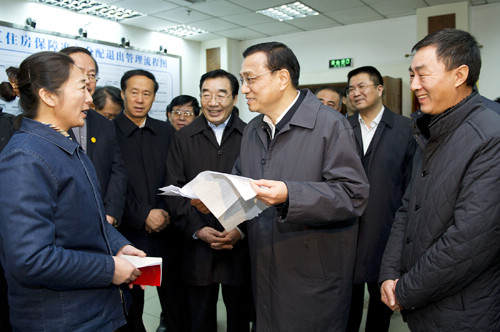|
 |
|
HOUSE GUARANTEE: Chinese Vice Premier Li Keqiang (front, center) talks with a local resident who is preparing to move into an affordable home in Langfang, north China's Hebei Province, on November 25, 2011 (XINHUA) |
China at present faces much uncertainty and many challenges both at home and abroad, and some in the world forecast a bear market in China's economy. During this sensitive period, the Central Government is slated to convene an economic work conference in the first two weeks of December.
Chinese Vice Premier Li Keqiang said recently that property restriction policies should be implemented, indicating that there is not any possibility for China to loosen regulations on property restriction or macro-economic control.
Li Keqiang, also a member of the Political Bureau of the Communist Party of China Central Committee, told Phoenix Television recently that China will finish the task of constructing high-quality affordable houses and ensure fair distribution of the houses to low-income residents.
The People's Bank of China, the country's central bank, announced on its website November 30 that it will lower the bank reserve requirement ratio by 0.5 percent on December 5, 2011.
Lu Zhengwei, chief economist with Industrial Bank Co. Ltd., said it was uncertain whether the central bank will adjust benchmark interest rate next year. "The most likely scenario is that the central bank would offer financial institutions greater decision-making power between the upper limit of bank reserve requirement ratio and lower limit of benchmark lending rate," Lu said.
Lu prospected that the central economic conference this year would set its goals in 2012 as carrying out prudent monetary policy and proactive fiscal measures. The former task would emphasize flexibility and pertinence, and the latter would center on structural tax reduction.
However, macro-economic operations face a series of uncertainties.
Industrial growth began to fall. According to the statistics from the National Bureau of Statistics, large enterprises nationwide with annual over 20 million yuan ($3.15 million) of revenue yielded 4.12 trillion yuan ($650.11 billion) in the first 10 months, a year-on-year rise of merely 12.5 percent.
Enterprises' profits shrank to only 6.04 percent during the past 10 months, with the cost accounting for 85.1 percent in large enterprises. Private businesses yielded only 5.96 percent, less than state-owned or stock holding businesses.
The HSBC Holdings Plc. said late November that the preliminary HSBC China manufacturing purchasing managers index (PMI), a gauge of nationwide manufacturing activity, fell dramatically to 48.0 percent in November from 51.1 percent in October, much lower than market expectations.
Li Yang, investment consultant with the Everbright Securities, said HSBC has long been concerned with small and medium-sized enterprises in PMI data. Therefore, the data implies that small and medium-sized enterprises bear greater pressure under the backdrop of eased macro-economic growth.
Small and medium-sized enterprises faced more difficulties in development, including high-level costs of production, labor and land resources, along with difficulties to get loans from banks, and high-level cost in finance. They also felt high-level taxes levied, and had difficulties to recruit new workers.
Some market analysts worried that the current economic situation was similar to the fourth quarter of 2008. Index indications this year, especially in October, were not as good as expected, both in terms of exports and fixed asset investment.
But a research fellow close to the government who declined to give his name said indexes this year, though having dropped somewhat, did not decline significantly, and are keeping stable.
China's economy developed obviously toward soft landing stable pace on the basis of faster growth in the past. Such economic decline is the result of active control of macro-economic forces. The current economic decline does not take place due to fundamental changes in economy, but because a raft of policies to catalyze economies in the last two years, a normal reaction following disappearing of policies.
Analysts argued that the reason that the economy declined was bolstered is that investment increase is stronger than expected. During the first three quarters, robust private investment increased by 34.2 percent compared with the same period last year, and their investment in fixed assets rose to 59 percent, 9.3 percentage points higher than the whole society investment in this term.
The Central Government recently paid great attention to the development situation of small and medium-sized enterprises. During a visit to the city of Wenzhou in east China's Zhejiang Province in October, Premier Wen Jiaobao requires banks to increase their tolerance for the non-performing loan ratios of small enterprises. Wen said small enterprises should enjoy more preferential tax policies, and asked local governments to reduce interference in small businesses.
Xia Bin, Director of the Institute of Finance of the State Council's Development Research Center, said at a forum on world economic outlook in Beijing on November 30 that it is necessary for China to maintain prudent monetary policy while strengthening fine tuning, as China at present faces a reduction of overseas demand, unsustainable high-level investment, real estate bubbles, as well as risks in local financial platforms.
Xia, also a member of the Monetary Policy Committee of the People's Bank of China, said the central bank should accelerate reform on the financial structural expenditure system, and make monetary polices tilt to strategic trades and small enterprises.
(Source: China Business News) | 